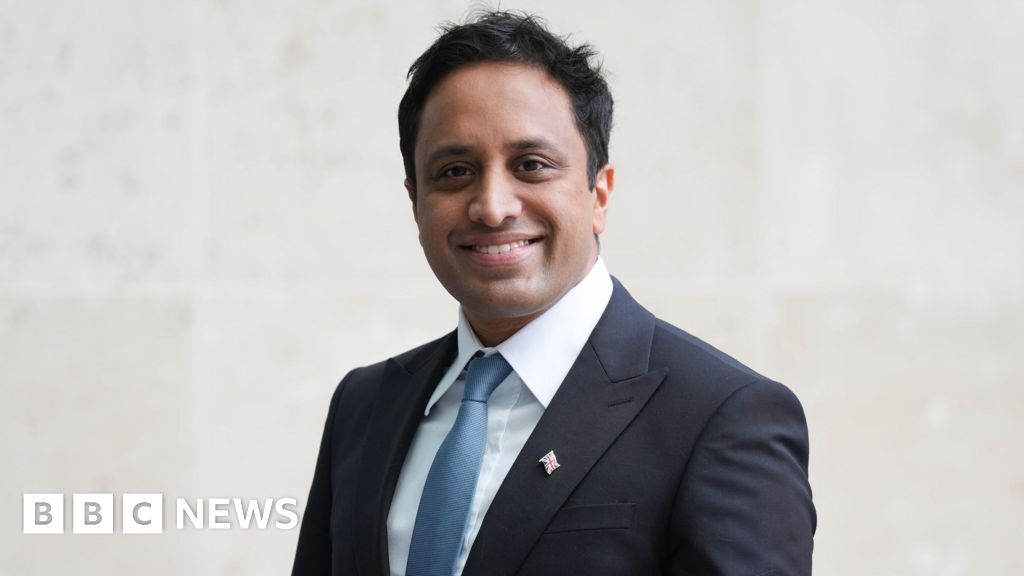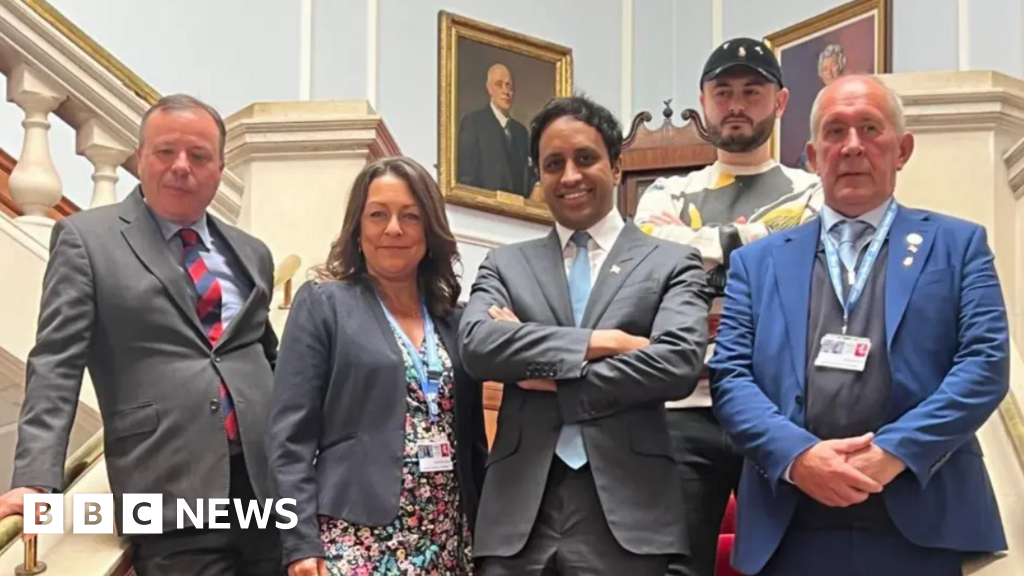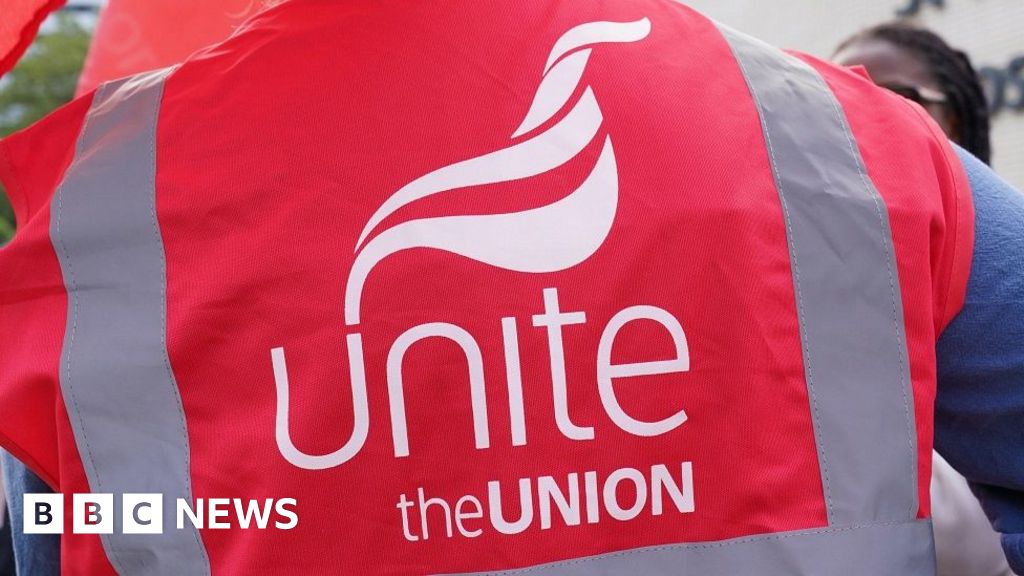ARTICLE AD BOX
Protesters in Londonderry spelt out the word "no" using the shoes of victims
A new bill on the legacy of Northern Ireland's Troubles will shift the focus from prosecutions towards "information recovery", the government has said.
Northern Ireland Secretary Brandon Lewis opened a debate on the bill in the House of Commons.
He said because most Troubles cases were more than 40 years old, the prospect of successful prosecutions was "vanishingly small".
Victims' families have held protests against the new legislation.
Ahead of the debate, victims' groups staged demonstrations in Belfast and Londonderry, asking why no-one would be brought to justice over their loved ones' deaths.
The Northern Ireland Troubles (Legacy and Reconciliation) Bill proposes replacing police investigations and court cases with an information recovery body.
That body would would offer immunity to people who co-operate with information reports for victims' families.
Conditional immunity from prosecution is a change to the blanket amnesty approach initially proposed last year.
Tuesday's second reading in the House of Commons is the first opportunity for MPs to have their say on the bill, which was laid before parliament earlier in May.
Brandon Lewis said it was "arguably cruel to perpetrate false hope" about Troubles-related prosecutions
Opening the debate, Mr Lewis said he and his team had spend the past 10 months talking to victims and "hearing the pain and perspectives of people from all view points and communities".
"During those conversations we have repeatedly had to confront what is a very painful reality, that with more than two-thirds of Troubles-related cases now 40 years old, the prospect of successful prosecutions is vanishingly small.
"And that's why this legislation does mark a definitive shift in focus to put information recovery for families at its core, in recognition of that.
'Offensive to the families'
Shadow Secretary of State for Northern Ireland Peter Kyle said the bill did not provide victims' families with a "process they can trust" and "deepens their pain and trauma".
The Labour MP said there was a possibility prosecutions could still proceed if the perpetrators failed to share an account of their actions to the information recovery body.
However, he criticised the "bar for immunity" which he said was set "so low" that it was hard to see prosecutions happening.
"Such a low bar is offensive to the families who have lost ones and in many cases waited decades for answers," Mr Kyle said.
Jim Shannon from the Democratic Unionist Party (DUP) appeared to hold back tears as he described the "murders" of his cousin and others at the hands of the IRA, and the subsequent lack of accountability.
The DUP's Jim Shannon became emotional when discussing the death of his cousin, who was shot by the IRA in 1971
He described his "angst and agony" for his constituents, saying: "I want to have the justice that they have been denied for over 50 years."
Mr Shannon asked what the UK government was doing to ensure that happened.
The SDLP leader Colum Eastwood said there was nothing in the bill for victims, and that the British Government was "not a neutral observer in what happened" in Northern Ireland.
"This is about politics, this is about a manifesto commitment. This is about protecting the state as it always is and it will protect every single perpetrator who committed those crimes."
Stephen Farry from the Alliance Party said the bill would produce "law that will prove to be utterly unworkable," and that there was an alternative.
"The Stormont House Agreement of 2014 represented an agreement between UK and Irish governments and most of the Northern Ireland parties. It also has the support of most victim groups and other stakeholders but it's never been implemented."
Manifesto commitment
All five main political parties in Northern Ireland have criticised the legislation, as have the Irish government and victims' organisations.
However, it has got the backing of military veterans and their supporters.
If the bill passes its second reading it would move to committee stage, with suggestions getting the legislation into law could take about six months.
The government has a working majority of more than 70 and passing the legislation would be seen as honouring a 2019 manifesto commitment to protect Army veterans from prosecution for historical offences.
Two Northern Ireland groups which represent many victims of Army shootings - Relatives for Justice and the Pat Finucane Centre - held protests against the bill at Guildhall Square in Derry and at the Northern Ireland Office in Belfast.
Members of some bereaved families also travelled to Westminster to hand in a letter at 10 Downing Street.
Victims' families in Derry spelt out the word 'no' using more than 200 pairs of shoes belonging to their dead loved ones
John Toland was shot dead by loyalist paramilitaries in Eglinton, County Londonderry, in 1976.
At the protest in Derry, his wife, Marie, described the bill as "shameful" and said her family and countless other victims' families would fight against it because they all deserved justice.
Along with other victims' families they have spelt out the word "no" using more than 200 pairs of shoes belonging to their dead loved ones, each pair accompanied with a picture of a life that was lost during the Troubles.
Families and campaigners opposing the legacy bill gathered outside the Northern Ireland Office in Belfast
The Northern Ireland Human Rights Commission said the bill was "substantially flawed" and incompatible with the European Convention on Human Rights.
"We have not had an acceptable amount of time or prior consultation to enter a detailed written response today, but having worked over-time and at speed we are sure that this bill is substantially, in fact almost certainly fatally, flawed," chief commissioner Alyson Kilpatrick said."
Andrea Brown's father, Eric, a police officer, was shot dead by the IRA in 1983 when she was 12, then she was injured five years later in a bomb attack that killed six soldiers.
Andrea Brown said victims are expected to forgive unrepentant killers
"Every day when I waken, I waken in pain - not just physical pain, but emotional pain," she told the BBC.
"There's nowhere else in the world that would try to make a law that murderers and serial killers do not have to face justice.
"Victims are meant to forgive, draw a line under it, but how can we? No one's sorry."
Raymond McCord, whose son Raymond Jr was murdered by loyalist paramilitary group, the Ulster Volunteer Force (UVF), in 1997, was also critical of the government's plan.
"It's nonsense, it won't work," he said.
"The murderers… all of a sudden they're going to walk into a room and tell people 'I killed him, I killed him'?
"Does the British government really believe that?
"If they do come forward, that person goes in and tells whatever details, laughing inside himself and saying 'I've got away with this and the state are saying: 'I'm not a bad boy'."
Raymond McCord said the government's plans are a nonsense
A group made up of Queen's University academics and the human rights organisation the Committee on the Administration of Justice (CAJ) has described the bill as "unworkable".
It has published a 22-page response to the bill.
"The conditional immunity scheme is a thinly-veiled effort to secure de facto immunity for state actors rather than a good faith effort to assist victims and survivors," the group stated.
'Cautious welcome'
Meanwhile, Northern Ireland's veterans commissioner Danny Kinahan has given a "cautious welcome" to the proposals.
"We need a new system," Mr Kinahan told BBC Radio Foyle.
"The parties are all against it from different points of view and we know the legislation will never suit everybody, so we got to find something that does the best."
He added: "No one came up with alternatives, everyone just attacked it, but we need to find a way that works best.
"You've now got a framework that looks like a much better framework, and people should be getting in there and finding out how they can change it and make it stronger so that the whole of society and not just veterans benefit from it."

 3 years ago
113
3 years ago
113








 English (US) ·
English (US) ·